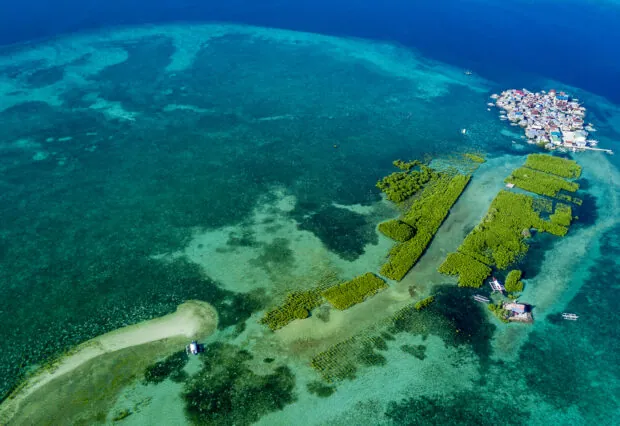A few days before World Ocean Day, Karen Sack, executive director of the Ocean Risk and Resilience Action Alliance (ORRAA) and Ulrike Decoene, director of communications, brand and sustainable development of the AXA group and chair of the board of directors of ORRAA are sounding the alarm on the financing of the blue economy.
It is unlikely that any of us would ever take the most valuable asset that we own and pollute, exploit and degrade it to such an extent that its value would decrease exponentially and even begin to threaten our very well-being. And yet we have.
The Ocean, covering two-thirds of the surface of our Earth, host to 80 per cent of all life, responsible for half the oxygen we breathe, weather patterns, much of the water that we drink and the food we eat; and transporting 90 per cent of the goods that we trade, is in trouble. The Ocean is our planet’s greatest and, at the same time, our most undervalued asset. Corporations, governments and people have largely taken it for granted. It has been and continues to be exploited through overuse. We have plundered its resources, polluted it with plastics, dumped chemicals and spewed toxins down rivers into it; and we have used the Ocean’s waters as maritime motorways and communications super-highways without paying any tolls.
Today is World Ocean Day. Yet there is little cause for celebration as in addition to all of the above maladies affecting the Ocean, record-high ocean temperatures over the past year are bleaching corals, disrupting marine species and melting ice caps. Forecasts of an ‘extraordinary’ hurricane season in the Atlantic, Caribbean and Gulf of Mexico are making headlines.
Today also marks exactly twelve months until the United Nations convenes its 3rd Ocean Conference (UNOC3) in Nice, France and the first ever Special Meeting on the Blue Economy and Finance, which will be hosted by Monaco.
The focus of UNOC3 is to consider what progress has been made at the mid-point towards the delivery of United Nations Sustainable Development Goal (SDG) 14: Life Below Water. SDG14 was almost discarded as unimportant when the Global Goals were being negotiated, and to date has received the least amount of public investment of the 17 SDGs.
We have twelve months to turn the tide, to navigate towards recovery and to open the way towards an ocean of investment opportunities.
Building a regenerative and sustainable blue economy is critical to addressing the global challenges of climate change, biodiversity, and food security. Unlocking investment for the Ocean is the essential catalyst to achieving this goal.
Economically: the value at risk faced by investors from maintaining current practices in the blue economy amounts to more than $8.4 trillion. The transition to a sustainable blue economy could reduce this by more than $5.1 trillion.
Socially: three billion people’s livelihoods are dependent on the Ocean, from fishers in coastal communities to some of the world’s largest cities. A regenerative and sustainable ocean economy provides substantial opportunities for protecting and advancing the rights of local and Indigenous Peoples, for improving gender equality and for building community resilience and adaptation.
Environmentally: A recent report shows how full implementation of ocean-based climate action could overcome up to 35% of the emissions gap between current practice and that needed for the world to be on a 1.5°C trajectory by 2050. At present, funding flows are minimal, but there are huge opportunities if investment can be mobilised.
Moving the Ocean towards sustainability requires profound changes across a range of areas, based on a sound scientific understanding of what can deliver a nature-positive ocean recovery. This includes implementing appropriate regulation and management based on prioritising biodiversity conservation and restoration of blue natural capital to support the re-emergence of natural marine abundance by protecting at least 30 per cent of the Ocean and ensuring that sustainable ocean plans are in place for the rest. As well as, transitioning to net zero across all aspects of corporate value chains, including ocean transport and logistics.
It will also need capital.
That is why the Blue Economy and Finance Forum (BEFF), hosted by Monaco, as a special meeting taking place immediately before UNOC3, will target the financial aspects of this transformation.
The BEFF aims to mobilise stakeholders from various sectors of the coastal and maritime economy, government representatives, multilateral actors, development banks and funds, private finance and insurance, foundations and the world of philanthropy. It is geared towards delivering financing at scale for mitigation, resilience, regeneration, and adaptation.
We must change the current paradigm of ocean investment. This requires three simple but, at the same time, incredibly challenging steps to create a capital market for the Ocean.
Firstly, securing investments into proof-of-concept and scalable projects with the prospect of bankable returns. At the level of individual projects, communities, start-ups and entrepreneurs in the sustainable blue economy, we need to encourage a flurry of incubation and acceleration, along with local access to finance and impact investment, so that the millions can flow.
Secondly, mobilising and accelerating investment into foundational funds and financial vehicles. At the level of large-scale blue infrastructure projects, of national and international public sector and corporate activity, we need financial institutions, the commercial banks, the local and international capital markets and supporting actors, such as Development Finance Institutions and Multilateral Development Banks, and the insurance sector, to fully align with the regenerative and sustainable blue economy vision. They must use their expertise to effectively and efficiently support fund flows and long-term investments so the billions needed are put to work.
And finally by establishing the platforms, principles and guidelines needed to underpin an equitable and sustainable blue investment landscape at the systems level. These will ensure that central banks, financial regulators, international standard setters and some of the world’s largest financial institutions, are increasingly aware that natural capital, climate, biodiversity and ocean risk, need to be part and parcel of balance sheets, in taxonomies, and in disclosure and reporting standards, to encourage prudent behaviour and the effective allocation of the required trillions of global capital needed.
So, milestones like today are important. UNOC3, hosted by France and Costa Rica, in Nice next year is going to be pivotal, as is the Blue Economy and Finance Forum in Monaco just before.
We must capitalise on these moments to make movements.
The financial and insurance sectors globally need to play their role in turning this tide if we are to catalyse the capital needed to make 2025 a blue finance super year.
Karen Sack is Executive Director of the Ocean Risk and Resilience Action Alliance (ORRAA), the only multi-sector collaboration connecting the international finance and insurance sectors, governments, non-profits, and stakeholders from the Global South to pioneer finance products that incentivise investment into coastal and ocean Nature-based Solutions. Its mission, by 2030, is to activate at least USD$500million of investment into this space, and in so doing, help build the resilience of at least 250 million climate vulnerable coastal people.
Ulrike Decoene is the AXA Group Head of Communication, Brand and Sustainability since 2019, and a member of the AXA Management Committee. She has held teaching positions at the universities of Yale and Paris-Est Marne-la-Vallée. Ulrike joined AXA in 2007 as Head of Media Relations and Internal Communications of AXA Investment Managers, after working for several offices of the French government between 2003 and 2007. She then joined the Group’s Mediterranean, Latin America and Africa region as Head of Communications, Corporate Responsibility and Public Affairs, before becoming Director of the AXA Research Fund in 2015. From 2016 to 2019, she served as Chief of Staff to Thomas Buberl, CEO of AXA. She is also the Chair of ORRAA’s Board of Directors.
ORRAA is working with France, Monaco, The World Resources Institute, World Economic Forum, and other partners to mobilise the needed million, billions and trillions to build a capital market for the Ocean.
A version of this appeared in the French publication La Tribune on the 7th June 2024. Please click here to see the article.




